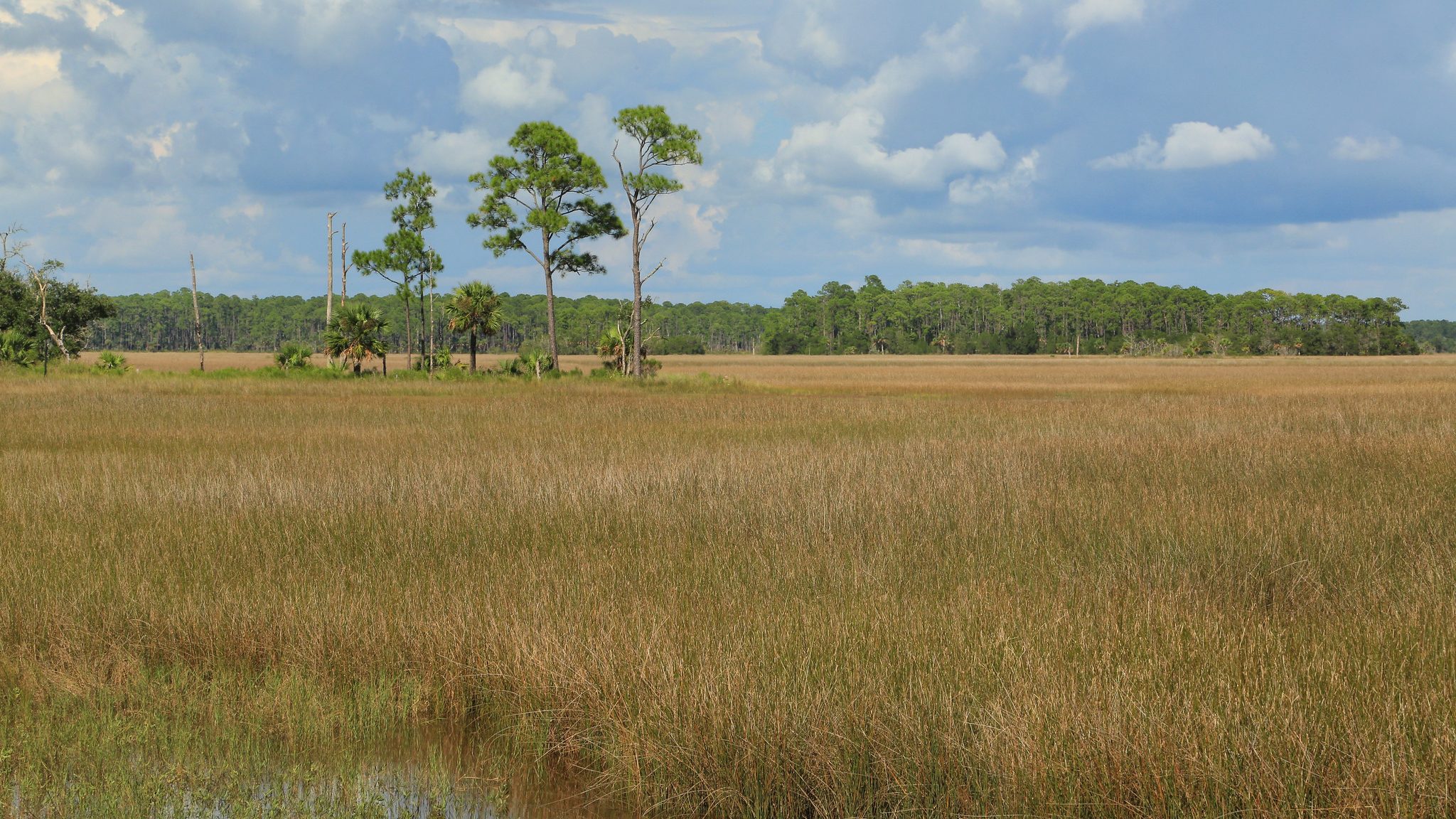Expansion of Mangrove Forests Into Salt Marshes Impacts Wetland Ecosystem Services

FOR IMMEDIATE RELEASE
Changing climate conditions continue to play out in ways that can be seen in changes to natural ecosystems. These ecosystem impacts are experienced by people in multiple ways because of the many ways we depend on and get benefits from ecosystems. A recent study supported by the Southeast Climate Adaptation Science Center focused on coastal transitions of salt marshes to mangrove forests in response to warming winters, reviewing current understanding of the effects on ecological and societal benefits of this transformation, and providing critical insights for coastal environmental managers.
In coastal areas along the Gulf of Mexico and Atlantic Ocean of the southeastern United States, the frequency and intensity of extreme freeze events largely determines whether coastal wetlands are dominated by freeze-sensitive woody plants (mangrove forests) or freeze-tolerant grass-like plants (salt marshes). “In the southeastern United States, there are many tropical cold-sensitive species that are expected to move north in a warming world,” says Michael Osland, USGS scientist and lead author of the study.
Tropicalization is a term used to describe the transformation of temperate ecosystems due to the northward movement of tropical plant and animal species. Previous studies have identified areas of mangrove’s northern range limits in coastal areas of Texas, Louisiana, and northern Florida that define hot spots where mangroves are anticipated to expand. “Mangrove forests are an especially striking example of tropicalization. The northward range expansion of mangrove forests at the expense of salt marshes is an ecological transformation that has many societal implications,” says Osland.
Coastal wetlands are highly valued for the multiple ecosystem benefits they support. The research team investigated the following ecosystem goods and services provided by both salt marshes and mangrove forests: carbon sequestration; land loss avoidance; erosion control; water purification; coastal protection; maintenance of fisheries; maintenance of avian communities; recreation and tourism; and raw materials and food. This extensive review, produced by a team of both researchers and managers in coastal areas, takes each of these ecosystem services in turn, summarizing current research relevant to the southeastern U.S. on important ecological and societal aspects of each benefit.
“This review shows that there are tradeoffs associated with mangrove expansion,” says Osland. “Mangrove expansion can lead to positive changes in some ecosystem services, sometimes at the expense of other ecosystem services. As a result, there are some coastal areas where managers seek to promote and accelerate mangrove expansion and other areas where managers are looking for ways to remove mangroves and prevent further expansion.” They highlight the situation at two areas where such trade-offs are observed, Cedar Key (Florida) and Aransas (Texas). As examples, positive changes from mangrove expansion such as enhanced pelican habitat may be offset by negative changes such as loss of coastal views at Cedar Key, and a positive improvement in wind protection for fishing at Aransas may be offset by reduced access to fishing grounds.
Though there has been a recent increase in the number of studies on the effects of mangrove range expansion, this study points to knowledge gaps and emerging research needs that are important to informing work by coastal scientists and decision making of coastal natural resource managers.
The article, The impacts of mangrove range expansion on wetland ecosystem services in the southeastern United States: Current understanding, knowledge gaps, and emerging research needs, was published in Global Change Biology in early view access 31 Jan 2022. Authors are Michael J. Osland, A. Randall Hughes, Anna R. Armitage, Steven B. Scyphers, Just Cebrian, Savannah H. Swinea, Christine C. Shepard, Micheal S. Allen, Laura C. Feher, James A. Nelson, Cherie L. O’Brien, Colt R. Sanspree, Delbert L. Smee, Caitlin M. Snyder, Andrew P. Stetter, Philip W. Stevens, Kathleen M. Swanson, Lauren H. Williams, Janell M. Brush, Joseph Marchionno, Rémi Bardou. https://doi.org/10.1111/gcb.16111.
- Categories:
